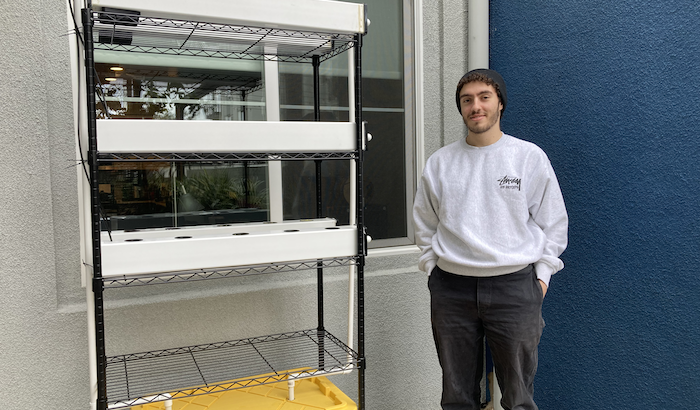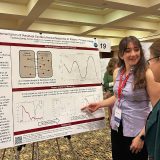
Computer Science Student Broadens Sustainable Futures Through Self-Manufactured Hydroponics Farm Honoring Fowler students’ commitment to environmentally-conscious design practices.
April 21, 2023
On Earth Day, members of the Chapman community assess how they can plant seeds of change in their daily lives, doing their part to prioritize sustainable practices. For Computer Science student Michael Bishai (‘23) this is a no-brainer. His personal commitment to environmental consciousness focuses around visualizing ways that everyday people can pursue sustainability through modeling and design, specifically with the help of automated, self-constructed hydroponics farms.
Bishai’s hydroponics model is specially-engineered to reuse water, preventing it from dissipating into the soil like traditional farming processes. It directs water flow through PVC pipes into one side of a series of horizontal bars. The 3D-printed cups built into the bars contain synthetic soil—such as moss or rock wool—to help seeds absorb water from below. Once the water can drain out through the other side, it is collected within a reservoir bin before an aquarium pump sends it through the pipes once more. This cyclical system allows for a more sustainable alternative means of growing.
“The advancement of hydroponics is super important because there are significant environmental problems out there with oil drilling, soil and vegetation being removed in climate disasters, and intensive farming,” Bishai stated. “We have to be more concerned with our options—how do we use what we know to keep things sustainable for the future? With a lot of current questions about how these issues are going to affect the environment, knowing how to grow in all sorts of conditions as well as being conscious of the resources and skills we have are both vital.”
With these core intentions in mind, Bishai began constructing his hydroponics prototype in the final months of 2022, using a plethora of skills and software taught in Fowler School of Engineering (FSE) courses. Throughout the process, Bishai applied his knowledge of Autodesk Fusion 360—virtual manufacturing technology available to all Chapman students—to model and measure each individual piece. On April 12th, 2023, after months of mindful redesign and care, Bishai was thrilled to discover that the automated farm had successfully grown its first sprout.

First sprout grown successfully in hydroponic farm.
Photo by: Michael Bishai
Bishai also shared excitement about the accessibility benefits inherent to his prototype, emphasizing how it can provide additional support where traditional farms may not be feasible due to size or environmental constraints. “In any compacted area or place where a community garden should be, this is the kind of design to consider because it takes up minimal space; this farm is able to live on my patio,” said Bishai. At peak functionality, the finished prototype will be able to fit 40 vegetables within around 30 cubic feet.
While the core goals Bishai had set for his hydroponics farm have been achieved, he expressed an interest in continuing to revise its design, exhibiting the spirit of exploration and progress that inspires Fowler students every day.
“It’s funny because I don’t think I’m ever going to finish this project; I’m always going to be making new versions of it,” shared Bishai. “I know that I’m going to keep finding something else to add, whether I want to make it protected from bugs, use it to cure plants with ailments, modify it for the Chapman community gardens, or integrate machine learning into the growth. There are a million ways I can adapt it or apply it to different areas, and that’s what makes it fun: it’s an open project and I can choose where it goes.”
Bishai’s hydroponics prototype is one of many FSE research endeavors designed to explore the intersection of sustainability and engineering. These projects inspire students to consider the impact their work has on the planet, examining how their research initiatives can align with the university’s mission to promote environmentally-conscious futures across communities.
“FSE students are involved in a variety of research projects that highlight a commitment to the environment and innovation in engineering,” shared Dr. Thomas Piechota, a professor at both FSE and Schmid College of Science and Technology. Much of Piechota’s own research investigates climate impacts on regional water resources using geographic information systems. “These students’ research includes how high resolution remote sensing data is used to evaluate ways that drought tolerant plants such as chia can be used as a replacement for more water intensive crops in California, as well as reusing organic materials (for example, coffee grinds) in new forms of resins for 3D printing.”
Bishai offered final words of encouragement to anyone interested in supporting sustainability efforts both on and beyond April 22nd: there are always new and exciting ways for everyone to positively affect the world around us through innovation and collaboration. “The best part is that it doesn’t have to be Earth Day for someone to give this a try and be more conscious of how we can do things like this for ourselves and for other people. I’m now saving on water, saving on produce, and building something that can help others and our planet—and I’m having a good time doing it.”

